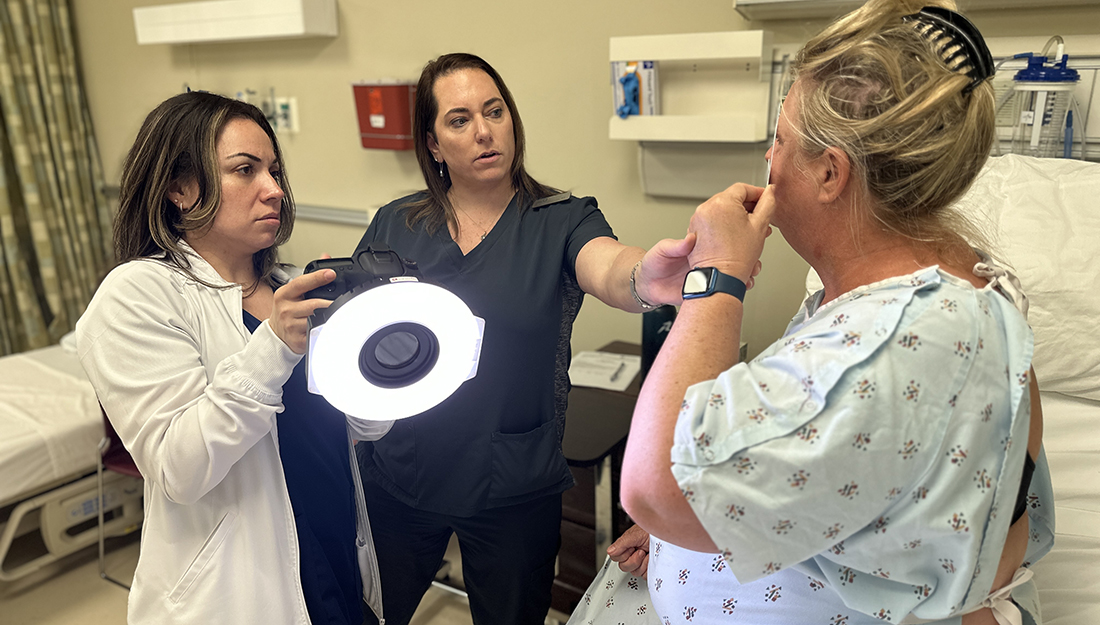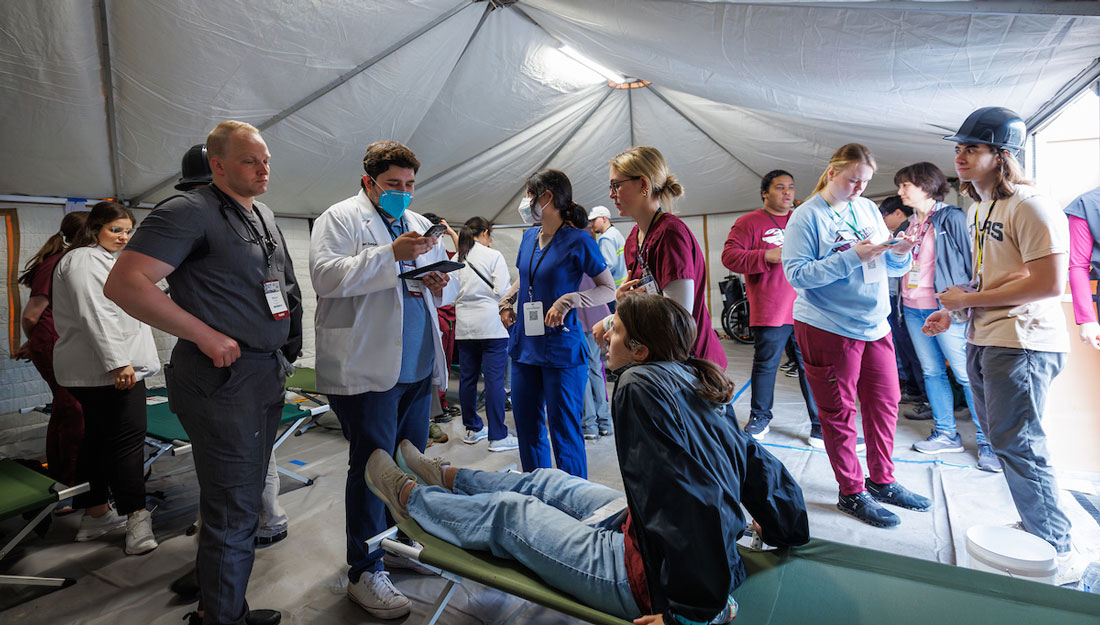- Diane L. Oswald
- Community, Editor's Pick, Nursing, Show on VR homepage
Sex trafficking: When the inconceivable happens
Nursing students learn to advance health, advocacy and justice through forensic nursing courses

Working as a sexual assault nurse examiner (SANE) is not for the faint of heart. Laurie Charles, MSN, RN, SANE-A, SANE-P, CA-CPSANE, has stood her ground in the emergency department, positioned between a frightened teenage girl who had been rescued from sex trafficking and the angry perpetrator who enslaved her. For 19 years, Charles provided compassionate, quality health care while collecting and preserving evidence, helping one patient at a time. Now a clinical assistant professor in the Forensic Health Care program at Texas A&M College of Nursing, Charles aims to help hundreds of patients by teaching nursing students and professional nurses how to care for survivors of sex trafficking.
“Sex trafficking is a hidden, market-driven crime that travels our interstates, boards our public transportation and leverages the anonymity of the victims,” Charles said. “Although inconceivable to most Americans, this heinous industry is a stark reality for nurses working in emergency departments and clinics across our state and nation.” Through teaching courses on forensic health care, mental health, justice and human trafficking, Charles and her colleagues at the college are equipping students with the information and skills needed to help survivors through the emotional, psychological and physical impact of abuse, while collecting and preserving evidence in support of justice.
Often called modern slavery, sex trafficking refers to inducing anyone through force, fraud or coercion to perform or participate in commercial sexual acts.
According to the National Human Trafficking Hotline, there were more than 5,500 sex trafficking cases reported in the United States in 2016. Because many of these crimes go unreported, it is estimated that between 14,500 and 17,500 people are trafficked into the U.S. each year. Traffickers prey upon the most emotionally, socially and physically vulnerable and those whose absence might go unnoticed. Victims are generally children, between 12 and 14 years of age.
“Many of the victims are runaways who are befriended, provided basic food and shelter and—as they begin to trust the trafficker—forced into prostitution,” Charles said. “These victims did not choose to be used or enslaved, but escaping is not easy.”
Drugs, violence, threats, lies and isolation are the ties that bind victims to sex traffickers, who can sell them multiple times each day to countless abusers, the majority whom are men. “We often treat survivors for drug and alcohol addictions and injuries, while working to assure them that they are safe, they have nothing to fear from us and they are in control of our interaction,” Charles said. “Providing health care for sex traffic survivors is challenging, gut-wrenching work, and I am hopeful that one day soon, these services won’t be needed.”
“We have to stop trafficking on both ends of the transaction,” Charles added. “If only the traffickers are targeted, more traffickers will enter the market to fill demand. Stopping both the supply and the demand is key, but it will take a community effort.”
Nurses are important players in that community, and the College of Nursing is a leader in preparing Bachelor of Science in nursing (BSN) students who have a working knowledge of evidence collection, understand the importance of the chain of custody, can work as a member of a multidisciplinary health care and law enforcement team and use forensicly accurate terminology.
“Most hospitals don’t have SANEs, so it is critical for nurses working in every health care setting to be able to properly assess and treat victimized patients, collect and document evidence and provide expert witness testimony if needed,” Charles said. The college is preparing BSN students to step in as needed, through six and a half hours of education and training on sexual assault, interpersonal violence and how to respond to patients and their families. Texas law requires licensed registered nurses to have only two hours of this education. Additionally, the college offers a Master of Science in forensic nursing for those who want their career to focus on assisting survivors and law enforcement. Applications for the new MSN in forensic nursing open in the fall.
“Nurses can make a significant difference in the lives of patients who have been victims of sex trafficking and abuse,” said Sharon Wilkerson, PhD, RN, CNE, ANEF, founding dean of the College of Nursing. “By including forensic nursing education in our undergraduate curriculum and adding a master’s program, we are helping to equip the state with advocates against violence and agents of care.”
Public awareness is important as well. “If you suspect that someone is being held against their will, or that they may be a sex trafficking victim, call the police when it is safe for you to do so, and ask them to investigate,” said Charles. “The action you take may help rescue someone from an inconceivable fate.”
Media contact: media@tamu.edu


